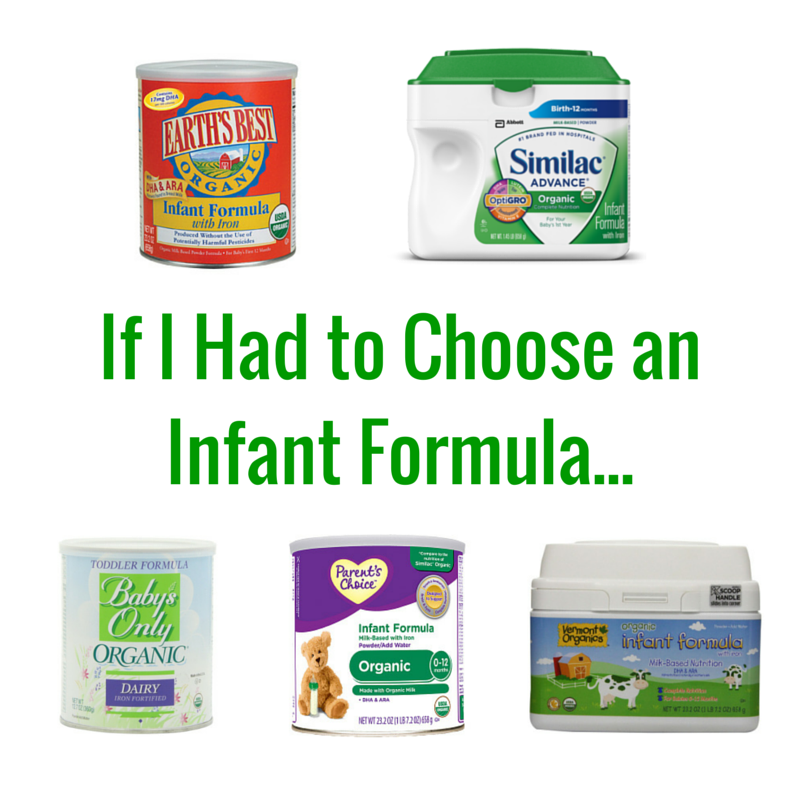|
I’m always thinking worst-case scenario. It’s probably not healthy, but that’s what I do. I like the feeling of preparedness. So with the birth of my third baby approaching, I've been asking myself, What would I do if for some reason I couldn't breastfeed? Now, I've never had a problem with breastfeeding before, but I did have to wean my daughter earlier than I wanted to in preparation for a radiation treatment for thyroid cancer that would have put radiation into my milk. I ended up not doing the treatment though, but had already weaned her. So you just never know. Luckily, she was 14 months old so I didn't have to switch her to any type of formula. We just gave her goat milk, along with her solid foods and vitamins. Some moms who are unable to breastfeed opt to use donor breast milk from a milk bank. I wouldn't recommend this because there’s no way to know about the diet of the mother, or what medications she could be taking, or what toxins she may be exposed to. Also, the milk is usually pasteurized, which means that many of the nutrients are destroyed. So I've looked at different recipes for homemade infant formula and I've found quite a few. Of course you could drive yourself crazy trying to find the perfect substitute for breast milk because nothing compares to the milk of a healthy mom. But if I needed a formula to use full-time I would purchase this formula-making kit from Radiant Life Company. The recipe comes from the book Nourishing Traditions, which is largely based off of the nutritional advice of Dr. Weston A. Price. The kit is expensive up front, but in the long run, it ends up costing about the same as (or even less than) commercial organic baby formulas. Plus you need to buy your own raw cow’s milk for the milk base, liquid whey, and cream. Check out realmilk.com for information about how to obtain raw cow’s milk near you. The reason I like this formula is because of the high-quality, real-food ingredients. Nothing is synthetic. Here’s a quick overview of the ingredients in this kit and what nutrients they provide: Bifidobacterium Infantis- This is a probiotic that promotes proper digestion and absorption and encourages the production of antibodies. Acerola Powder- This is one of nature’s highest sources of vitamin C. Lactose- This is an essential addition to cow’s milk, since mama’s milk is higher in lactose than cow’s milk. It’s especially important for proper nervous system development. Coconut Oil, Sunflower Oil, and Cod Liver Oil- These are oils that, when used together, mimic the fatty-acids in mama’s milk. Nutritional Yeast- This provides important vitamins and minerals. Gelatin- This improves the digestibility of the formula and lactose. Now, if I just needed to use formula for a short while (like if I had to take medicine and was required to pump and dump for a few days) I would go with a commercial baby formula. But it would definitely have to be organic, to avoid GMOs, and traces of pesticides, antibiotics, growth hormones, and other contaminants. There are five organic formulas that I know of, which I've listed below, providing a little comparison. 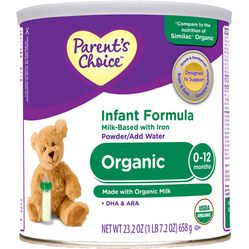 Parent’s Choice Organic Infant Formula. This is Walmart’s brand. It’s a good option if you’re looking for something inexpensive, but still organic. However, the oil that is used in this formula is palm oil. Research has shown that infants do not properly absorb palm oil, which means that overall fat absorption is lower in infants who consume formula containing palm oil (source). Researchers also believe that the unabsorbed palm oil in the gut may react negatively with calcium, since babies who are fed formulas containing palm oil also have lower bone mass (source). I also don't like that the carbohydrate sources are glucose syrup solids and maltodextrin. I think I would prefer just lactose, since that is the carbohydrate found in mama's milk. 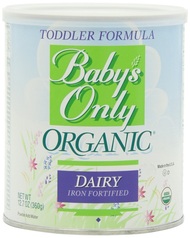 Nature's One Baby's Only Organic Formula. Nature's One is the only organic infant formula company that is family-owned. I like that. And if you take a look at their website you can see that they are dedicated to nutritional research and providing a high-quality product. This is the only company that states that they offer a non-hexane method of extracting their DHA/ARA (fatty acids). Other formula companies derive their DHA/ARA from laboratory-grown algae and fungus using hexane, which is a neurotoxic chemical (source). Nature's One derives their DHA/ARA from egg phospholipids without the use of chemicals. And they are also the only company to offer the option of a formula without DHA/ARA. This formula also does not contain palm oil. At first I didn't like that rice syrup is the carbohydrate source. That was concerning to me because there have been reports of high arsenic levels in rice. However, they do state on their website that their rice syrup is purified, tested, and consistently tests undetectable for arsenic. It's nice that they take that extra step. 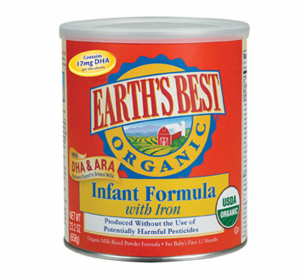 Earth's Best Organic Infant Formula. What I like about this formula is that one of the carbohydrate sources is lactose. However, they seem to be moving away from lactose, since in the past it was their only carbohydrate source. Now they also include glucose syrup solids. This formula also contains palm oil. 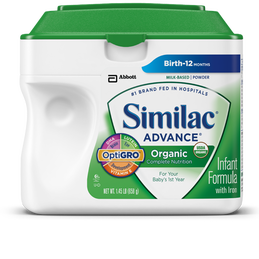 Similac Advance Organic Infant Formula. Similac does not specialize in organic formula, but they do offer an organic option. Similac is manufactured by Abbot, the same producers of popular nutritionals like Glucerna and other products for people with diabetes. Interestingly, the carbohydrate sources used in this infant formula are some of the worst - maltodextrin and sucrose (plain old sugar). This means that it's really sweet, and possibly addictive. In 2009 the European Union banned the use of sucrose in infant formula due to rising rates of childhood obesity and concerns about overfeeding (source). One would think that a company who manufactures diabetic products would be more careful about carbohydrates in their infant formulas, right? One thing I do like about this formula is that it does not contain palm oil. 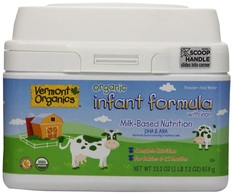 Vermont Organics Infant Formula. This formula contains palm oil, and the carbohydrate sources are glucose syrup solids and maltodextrin. Nothing about this formula really stands out to me as being any better than the others. A little interesting fact about this company is that it is owned by Perrigo, which is one of the world's leading manufacturer of pharmaceuticals. So, if I had to choose a commercial baby formula, Nature's One Baby's Only Organic would be my choice. I would also add infant probiotics and probably also a digestive lactase enzyme to help with the digestion of lactose. And if I were using formula full-time, for a long period of time, I would make my own, following the recipe mentioned above.
How about you? Have you ever given your baby formula? If so, which one did you decide to use? Did you like it?
3 Comments
Irene
5/8/2015 09:53:07 pm
hi tara, i really super love your blog. my baby was less than a year old when i came upon your blog and i love reading it. it is so different from all the other christian mommy blogs out there. every topic that you discuss are all the things that i deal with as a christian woman/wife/mom of this "modern" age. i was worried something happened that's why you couldn't blog for a while and i kept checking. but so glad you're back. i guess your baby girl must be here already? congratulations! much love :-*
Reply
Crunchy Christian Mama
8/23/2015 01:46:22 am
Thank you so much for your comment. That really made my day. I always hope that my posts are encouraging others, but I never know unless someone tells me. So it's nice to hear from one of my readers. :) My baby girl is six months old. How old is your baby now? Sorry I took such a long break from blogging. As I'm sure you can relate, life sometimes gets very busy and things like my blog have to take a back seat. I love blogging though, and I plan to most more frequently as we begin homeschooling again in about a week!
Reply
Grecia
7/17/2016 03:32:49 pm
Hello
Reply
Your comment will be posted after it is approved.
Leave a Reply. |
